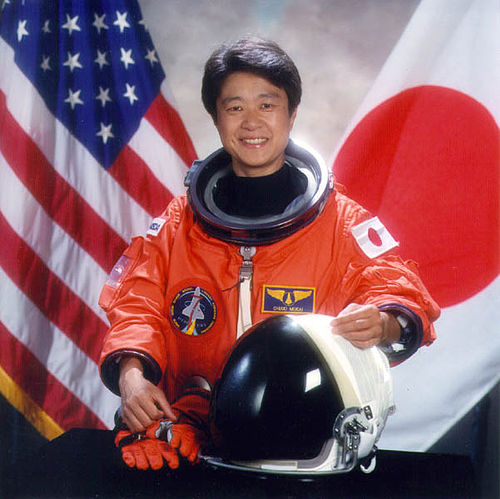Important dates
- 6 May, 1952 : birth of Chiaki Mukai in Tatebayashi, Japan
- 1983: Chief Resident in Cardiovascular surgery and promoted Assistant Professor at Keio University Hospital’s Cardiovascular surgery department
- 1988: Second doctorate in physiology
- 1992: Research instructor in Baylor college Medicine’s department of surgery in Huston (Texas)
- 1994: Became the first Japanese woman to fly onto space
- 1998: First Japanese citizen to undertake a second trip to space
- 2004 to 2007: Visiting professor at the International Space Biomedical Research office – senior advisor to Japanese Aerospace Exploration Agency’s executive director while publishing 60 papers
“Many people are losing themselves. They don’t have something to believe in… We should believe in ourselves and be more self-confident.”
At that time, no woman was expected to become a surgeon or an astronaut, but Chiaki did both.
Chiaki Mukai was born on 6 May, 1952 in Tatebayashi. In 1977, she moved to Tokyo for her education and received her doctorate in medicine from Keio University. Chiaki then completed 2 residencies and in 1983 she was raised Chief Resident in Cardiovascular surgery and was promoted Assistant Professor at Keio University Hospital’s Cardiovascular surgery department. In 1988, she earned her second doctorate in physiology, but it was only the beginning…
While working as a cardiovascular surgeon, Chiaki was approached by the Japanese National Space Development Agency. They offered her the opportunity to combine her passion for medicine, scientific research and she accepted. This opportunity led her to antigravity research and in 1994, she joined Columbia’s crew and became the first Japanese woman to fly onto space.
“Before men and women, we are human beings. That is common sense. If you want to do something, go for it.”
During 15 days onboard the Columbia, she orbited 236 times around the earth for the International Microgravity Laboratory flight and conducted 82 experiments looking at space life science, microgravity science and autonomic nervous system, bone and muscle metabolism and cardiovascular systems. Four years later in 1998 Chiaki went back to space as a payload specialist on a 9-day mission aboard the Discovery shuttle. Chiaki became the first Japanese citizen to undertake a second trip to space.
She logged another 134 orbits of the earth (or 6.1 million miles) while conducting experiments on the impact of space on the aging process for the Hubble Telescope Orbital Systems Test Platform.
In 1992, Chiaki Mukai began to work as a research instructor in Baylor college Medicine’s department of surgery in Huston (Texas). She then from 2004 to 2007 served as a visiting professor at the International Space Biomedical Research office and a senior advisor to Japanese Aerospace Exploration Agency’s executive director while publishing 60 papers.
Mukai received two “Outstanding Service Awards”, one from the National Space Development Agency of japan and another from the “Society of Japanese Women Scientists”. She was further honored with a” Special Congressional Recognition” from the U.S congress and the Prime Minister ‘s “Special Citation for the Contributions to Gender Equality”.
“Many people are losing themselves. They don’t have something to believe in…We should believe in ourselves and be more self-confident. “

